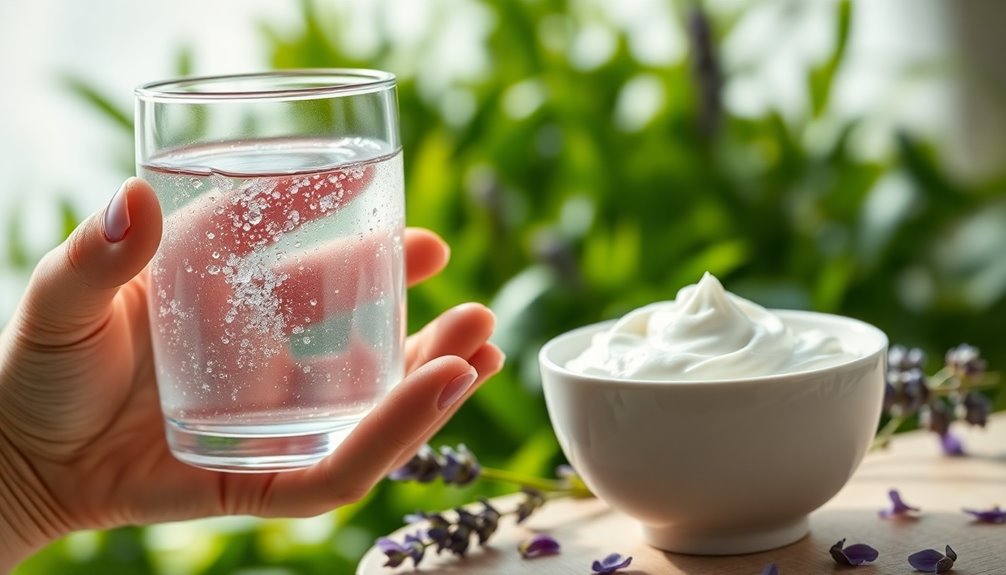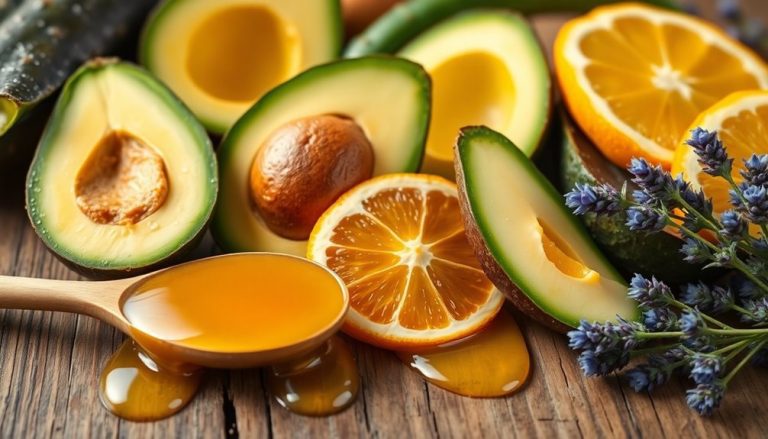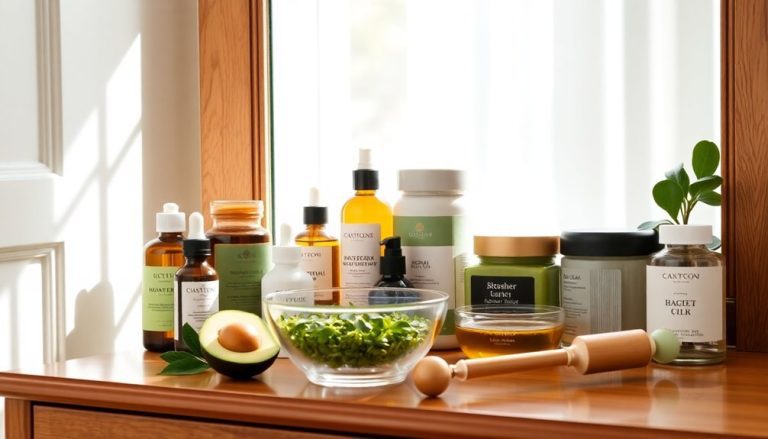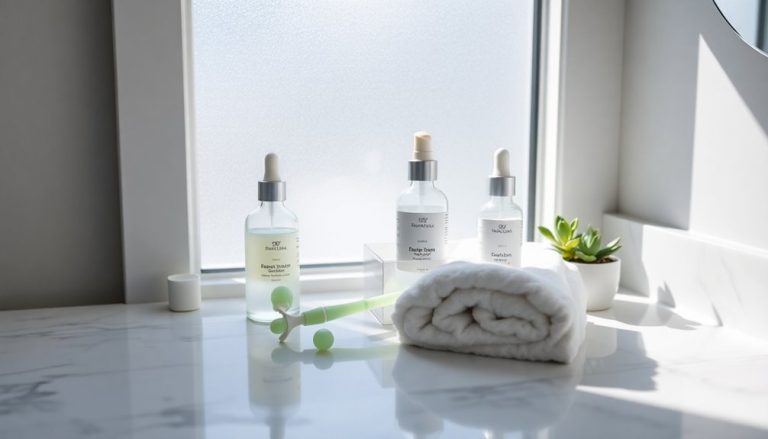To effectively hydrate your dry skin, start by drinking at least eight glasses of water daily. Use a humidifier indoors, especially in winter, to combat dry air. After showering, apply moisturizer on damp skin to lock in moisture. Incorporate facial oils for extra nourishment and choose gentle, hydrating cleansers that won't strip your natural oils. Additionally, prioritize a skincare routine with ingredients like hyaluronic acid, glycerin, and ceramides. Avoid alcohol-based products that can worsen dryness. Improve your skin's health further by exploring complementary tips that enhance hydration even more.
Key Takeaways
- Drink at least eight glasses of water daily to maintain skin hydration and overall health.
- Use a humidifier indoors to add moisture to the air, especially during dry winter months.
- Apply moisturizer on damp skin immediately after showering to lock in moisture effectively.
- Incorporate facial oils into your routine for extra nourishment and to seal in hydration.
- Choose gentle, hydrating cleansers to preserve your skin's natural oils and prevent further dryness.
Understanding Dry Skin
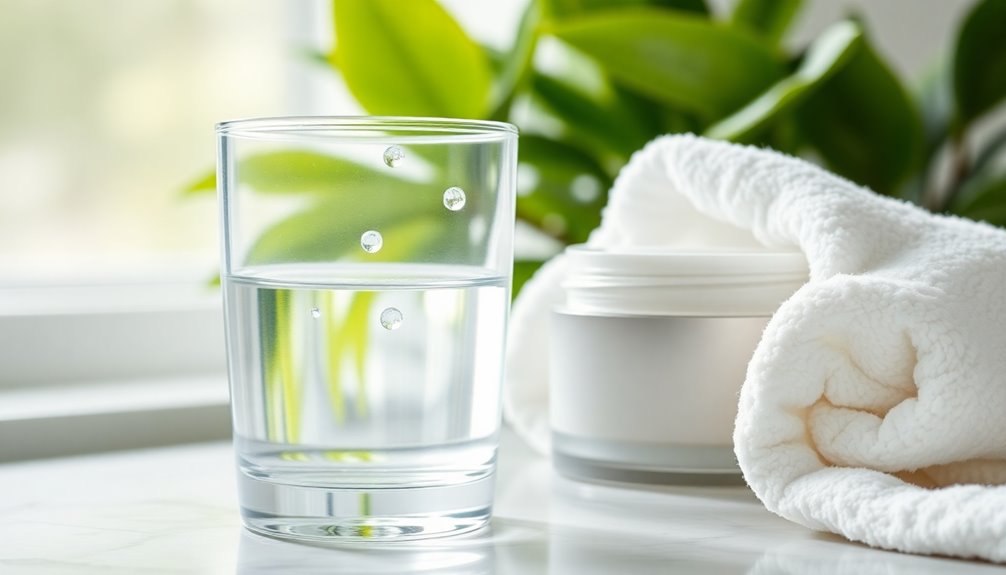
Understanding dry skin starts with recognizing its causes and characteristics. You might notice your skin feeling tight, rough, or flaky, which can be uncomfortable and even painful. This dryness often stems from various factors, including environmental conditions, genetics, and lifestyle choices.
For instance, cold weather can strip moisture from your skin, while hot showers may exacerbate the issue by washing away natural oils. Incorporating hyaluronic acid serums into your routine can significantly boost hydration levels.
It's essential to identify specific characteristics of dry skin, such as redness, itchiness, or a dull appearance. These signs can indicate that your skin's barrier is compromised, leading to moisture loss. Additionally, certain skin types, like sensitive or mature skin, may be more prone to dryness.
You should also consider the products you use daily. Harsh soaps and skincare items can further dehydrate your skin, making it vital to choose gentle, hydrating formulas. Incorporating Vitamin C serums into your skincare routine can also help enhance hydration and improve skin texture.
Importance of Hydration
Hydration is crucial for maintaining healthy skin, especially when dealing with dryness. When your skin's hydration levels are optimal, it can effectively function as a barrier against environmental stressors, preventing moisture loss. This is vital for keeping your skin looking plump and youthful. Regular use of exfoliating scrubs can help prepare your skin for better hydration absorption.
Without adequate hydration, your skin may become flaky, tight, and more prone to irritation.
Here are some reasons why staying hydrated is so important:
- Enhances Elasticity: Well-hydrated skin retains its elasticity, reducing the appearance of fine lines and wrinkles.
- Promotes Healing: Hydration supports your skin's natural repair process, helping to heal dryness and irritation faster.
- Balances Oil Production: When your skin is hydrated, it's less likely to produce excess oil, which can lead to breakouts.
- Boosts Radiance: Hydrated skin reflects light better, giving you a healthy, radiant complexion.
- Improves Absorption: Properly hydrated skin can absorb other skincare products more effectively, maximizing their benefits. Additionally, incorporating a Hyaluronic Acid Face Mist can provide an instant hydration boost throughout the day.
Best Moisturizers for Dry Skin
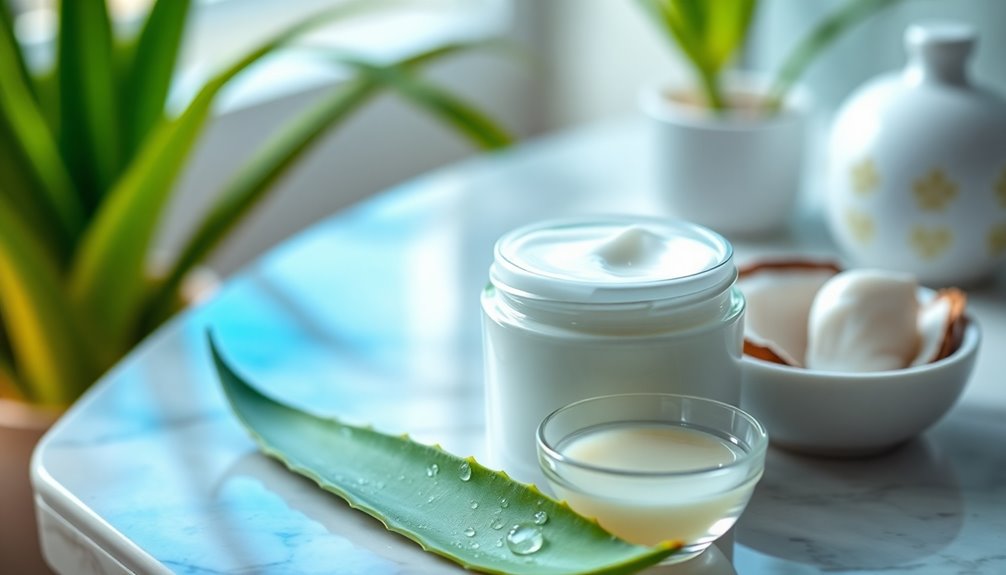
Finding the right moisturizer can make a significant difference in how your skin feels and looks, especially if you struggle with dryness. Look for products that contain hydrating ingredients like hyaluronic acid, glycerin, and ceramides. These ingredients not only draw moisture into your skin but also help lock it in.
If you prefer a richer texture, consider using creams or ointments. They tend to provide more intense hydration and are perfect for nighttime use. On the other hand, if you want something lighter for daytime, a lotion or gel-based moisturizer can work wonders without feeling heavy.
Don't forget to check the labels for added beneficial ingredients. For instance, aloe vera and shea butter can soothe and nourish dry skin. Avoid products with alcohol or fragrances, as they can exacerbate dryness and irritation.
Some popular options include CeraVe Moisturizing Cream, Neutrogena Hydro Boost Gel-Cream, and Eucerin Advanced Repair Cream. Each of these has received positive reviews for effectively combating dryness. Additionally, using best moisturizing creams can enhance your skincare routine and promote a radiant complexion.
Hydration Techniques to Try
If you're struggling with dry skin, incorporating effective hydration techniques into your routine can make a world of difference.
Start by drinking plenty of water throughout the day; staying hydrated from the inside out is crucial. Next, consider using a humidifier in your home, especially during colder months, to add moisture to the air.
Another technique is to apply your moisturizer right after you shower or wash your face. This locks in moisture and helps your skin retain its hydration. You might also want to explore facial oils, as they can provide an extra layer of nourishment and help seal in moisture.
Lastly, don't forget to be mindful of your cleansing routine; opt for gentle, hydrating cleansers that won't strip your skin of its natural oils.
Here are some hydration techniques to try:
- Drink at least eight glasses of water daily.
- Use a humidifier to maintain indoor moisture levels.
- Apply moisturizer on damp skin.
- Incorporate facial oils into your skincare routine.
- Choose gentle, hydrating cleansers.
These techniques can help you achieve smoother, more hydrated skin.
Lifestyle Changes for Skin Health
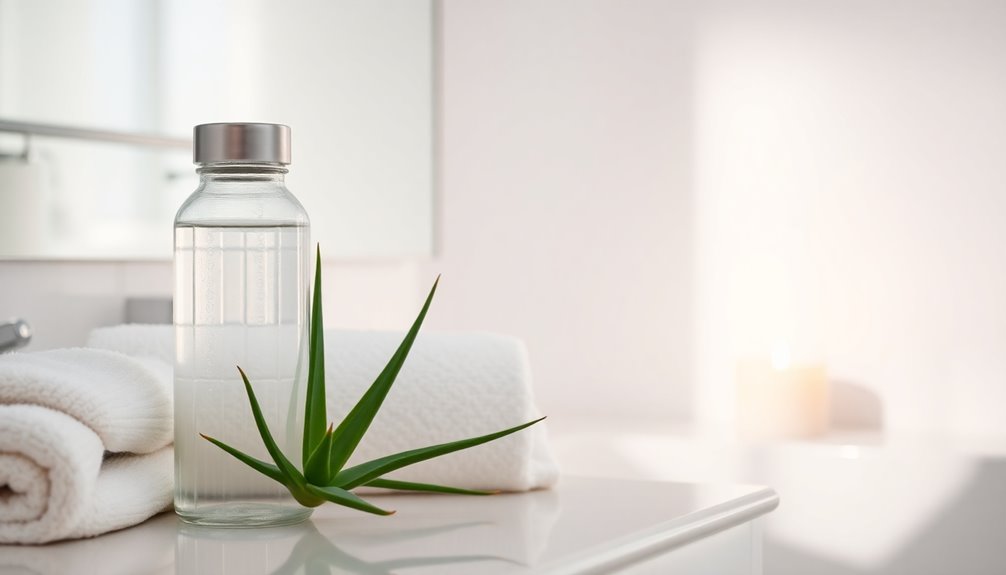
Making simple lifestyle changes can significantly enhance your skin health. First, prioritize hydration by drinking plenty of water throughout the day. When your body is well-hydrated, your skin reflects that vitality.
Consider incorporating a regular skincare routine, including gentle cleansers and moisturizers designed for dry skin.
Next, pay attention to your sleep habits. Aim for 7-9 hours of quality sleep each night. Your skin repairs itself during sleep, so ensuring you get enough rest is crucial.
Additionally, manage stress effectively. High stress levels can lead to skin flare-ups, so find activities that help you relax, like yoga or meditation.
Don't forget about sun protection. Daily sunscreen application is vital, even on cloudy days. UV rays can dehydrate your skin and accelerate aging.
Lastly, limit exposure to harsh environmental factors. Use a humidifier during dry seasons and avoid long, hot showers that can strip your skin of moisture.
Foods for Skin Hydration
Incorporating a variety of hydrating foods into your diet can make a noticeable difference in your skin's moisture levels.
These foods not only help keep your body hydrated but also provide essential nutrients that promote healthy skin. By focusing on a few key items, you can boost your skin's hydration from the inside out.
Consider adding these hydrating foods to your meals:
- Cucumbers: With a high water content, they're perfect for snacking and salads.
- Watermelon: This juicy fruit is packed with water and vitamins, making it a refreshing choice.
- Avocados: Rich in healthy fats, they help maintain skin elasticity and hydration.
- Oranges: Loaded with vitamin C and moisture, they can brighten your skin.
- Spinach: This leafy green is full of antioxidants and water, ideal for skin health.
Frequently Asked Questions
Can Weather Affect My Skin's Hydration Levels?
Yes, weather can definitely affect your skin's hydration levels. Cold, dry air can strip moisture, while humidity can help retain it. Keep an eye on the forecast and adjust your skincare routine accordingly.
How Often Should I Reapply Moisturizer?
You should reapply moisturizer at least twice a day, especially after washing your face or spending time outdoors. If your skin feels tight or dry, don't hesitate to add more throughout the day.
Is Drinking Water Alone Enough for Skin Hydration?
Drinking water alone isn't enough for skin hydration. You need a balanced approach that includes moisturizers and a healthy diet. Hydration comes from within and outside, so don't rely solely on water for optimal skin health.
Are There Specific Ingredients to Avoid for Dry Skin?
When dealing with dry skin, you should avoid harsh ingredients like alcohol, fragrances, and sulfates. These can strip moisture and irritate your skin, making it feel even drier and less comfortable than before.
Can Exercise Impact My Skin's Hydration?
When you sweat during a workout, you might notice your skin feels temporarily hydrated. However, if you don't replenish fluids afterward, your skin could end up even drier than before. Stay hydrated for glowing skin!
Conclusion
In the journey to conquer dry skin, think of hydration as your trusty shield against the elements. By embracing effective moisturizers and simple lifestyle changes, you can transform your skin into a vibrant canvas, glowing with health. Remember, every sip of water and nourishing bite you take is like planting seeds in your skin's garden, promising a bountiful bloom. So, why wait? Start incorporating these hydration techniques today, and let your skin flourish like never before.

